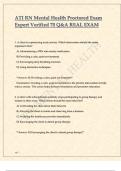-
1. Examen - Ati teas 7 all subjects (verified questions and answers 2022/2023)
-
2. Examen - Ati care of children rn 2019 proctored exam - level 3!. peds 2019 ( 70 questions with...
-
3. Examen - Rn ati drug dosage calculation and iv flow rate test bank with answers and rationale
-
4. Examen - Ati mental health proctored from blanche.
-
5. Examen - Ati pn nursing care of children proctored exam 2022 , pn ati nursing care of children...
-
6. Examen - Ati rn comprehensive predictor 2019 form a, b, c all in one || 180 q & a in each ve...
-
7. Examen - Ati rn mental health proctored exam (13 latestversions, 2024/2025) / ati mental healt...
-
8. Examen - Ati maternal newborn proctored exam (2022/2023 tested & verified)
-
9. Examen - Ati mental health final exam 2022/2023 a+ graded
-
10. Examen - Ati mental health final exam 2022/2023 a+ graded
-
11. Examen - Ati mental health final exam 2022/2023 a+ graded
-
12. Examen - Ati teas 7 comprehensive exam || (100% verified q & a) || (covers all section) || (ne...
-
13. Examen - Ati fundamentals proctored exam test bank 2023/2024
-
14. Examen - Ati capstone med surg assessment (latest verified version)
-
15. Examen - Ati pn medical-surgical- final exam 2023/2024 (verified version )
-
16. Examen - Ati rn leadership proctored exam 2019 version 1,2,&, 3 (all in one)
-
17. Examen - Ati rn mental health 2019 questions & answers
-
18. Examen - Ati rn nursing care of children proctored exam 2022/2023
-
19. Examen - Ati comprehensive exit exam 2020/2021/2022
-
20. Examen - (ngn) ati comprehensive exit exam 2024/2025
-
21. Examen - Ati math critical care 3.0
-
22. Examen - 2023 ati pn comprehensive exit exam (latest new generation ) questions & answers/ gua...
-
23. Examen - Ati rn comprehensive predictor retake
-
24. Examen - 2022/2023 ati rn exit exam questions and answers 100% correct/verified best rated a+ ...
-
25. Examen - {ngn}ati rn comprehensive 2023!!!!
-
26. Examen - Ati pn comprehensive proctored 2023
-
27. Examen - (ngn) ati mental health exam questions & answers 2023
-
28. Examen - Rn vati comprehensive predictor 2023-2024 new!!!
-
29. Examen - Ati community health proctored exam 2019 retake | latest update | a graded
-
30. Examen - [ngn] ati peds exam latest version 2023
-
31. Examen - Ati rn comprehensive predictor retake (180q & as) 20232024
-
32. Examen - Ati rn pharmacology proctored exam latest version 2023
-
33. Examen - Ati rn comprehensive predictor 2023/2024
-
34. Examen - [ngn] ati pn comprehensive predictor 2023 / 2024 real exam 180 questions and answers.
-
35. Examen - Ati rn fundamentals proctored exam 2023 with correct answers
-
36. Examen - Ati pn mental health proctored exam 2020
-
37. Examen - Ati pediatrics 2023
-
38. Examen - Rn ati concept-based assessment, proctored exam for level 2|test bank|2023/2024
-
39. Examen - Rn ati concept-based assessment, proctored exam for level 3|test bank
-
40. Examen - Rn ati concept-based assessment, proctored exam for level 4|test bank |
-
41. Examen - Ati nutrition test bank exam 100 questions with 100% correct answers 2024/2025 update...
-
42. Examen - Ati pn comprehensive predictor 2023/2024 retake guide (150 q & a)
-
43. Examen - Ati pharmacology ngn exam 2023/2024 a+ grade latest pass
-
44. Examen - Rn ati fundamentals latest 2023-2024 /ati rn fundamentals/fundamentals ati rn questio...
-
45. Examen - Ngn ati fundamental practice nursing exam 2023/2024 a+ grade
-
46. Examen - [ngn] ati fundamentals proctored exam 2023/2024 retake (all questions correctly answe...
-
47. Examen - Ngn ati rn mental health 2023/2024 (guaranteed pass!)
-
48. Examen - Ati rn fundamentals proctored exam 2023/2024
-
49. Examen - Ati pn fundamentals proctored exam 2023/2024
-
50. Examen - Ati rn fundamentals final exam with ngn
-
51. Examen - Ati: cms fundamental exam 2024
-
52. Examen - Ati community health exam 2023/2024
-
53. Examen - Ati maternal newborn ati proctored exam graded a latest version 2023/2024
-
54. Examen - Ati rn pharmacology ngn exam 2024/2025 || latest version!!!
-
55. Examen - Ngn ati rn pediatrics proctored exam 2023/2024 | next gen ati pediatrics proctored ex...
-
56. Examen - Ati rn fundamentals proctored exam expert verified 80 q&a real exam 2024
-
57. Examen - Ati pn fundamentals proctored exam expert verified 80 q&a real exam 2024
-
58. Examen - Ati pn mental health proctored exam expert verified 60 q&a real exam 2024
-
59. Examen - Ati pn medical-surgical proctored exam expert verified 90 q&a real exam 2024
-
60. Examen - Ati rn mental health exam with ngn 2023/2024 [actual screenshots]
-
61. Examen - Ati rn comprehensive exit exam latest version 180 actual q&a 2024
-
62. Examen - Ati rn mental health proctored exam expert verified 70 q&a real exam 2024
-
63. Examen - Ati rn community health proctored exam expert verified 70 q&a real exam 2024
-
Montrer plus




